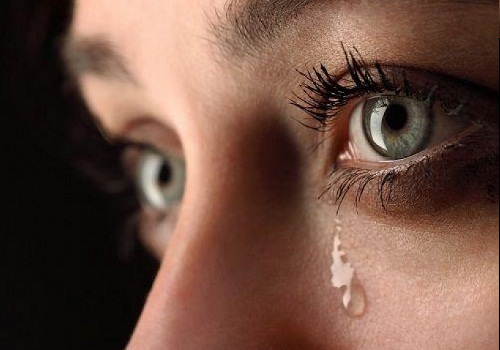6 Reasons Why it’s Good to Cry


Written and verified by the psychologist Bernardo Peña
What is crying? It’s considered a normal human emotional expression. It’s the reaction that your body has at a physiological, cognitive, emotional, and social level when confronted with different situations. From a scientific standpoint, however, it’s good to cry because crying allows you to release hormones that keep you from being in balance.
The secretion of tears is needed to keep your eyes in good condition:
- It provides an opportunity for your optical, metabolic, and lubricant functions to be developed.
- It helps clear out any foreign bodies and irritating substances that may be lodged in or around your eyes.
- In this way, tears protect your eyes from microbial infections.
Because of this, it’s never good to suppress your emotions because it can cause damage to your body in the long run.
When you hold back your tears, it can cause uncomfortable contractions in your muscles, blood vessels, stomach, and intestines.
Why is it good to cry?
Crying and laughter are equally beneficial. These two emotions help release positive and negative energy.
This helps you balance your moods. When you cry, you release adrenaline and noradrenaline, the hormones that cause your body to enter into a state of relaxation and relief.
Oxytocin, on the other hand, provides a sense of tranquility. This is why after you cry you have a sense of peacefulness that is similar to the feeling when you get out of the shower.
Do you want to know more? Read: 8 tips to fight sadness and depression
1. Crying releases tension and stress

Emotional tears are the ones that your body produces during happy or sad times.
When you become filled with worry, stress doesn’t give you the opportunity to think.
When you cry, however, you feel more relaxed because each tear sheds large doses of adrenocorticotropin. This hormone secretes cortisol and corticosterone, which are produced by your body when you have stress.
In addition, crying promotes the production of prolactin and leucine, which are natural pain killers.
In sum, crying is a chemical response that calms pain and reduces stress. In addition to that, crying causes your facial muscles and the corners of your eyes to contract.
This allows blood to reach your ocular mucous membranes and deliver fluids.
2. Hydration
- Basal tears are generated independently of your emotions. They are simply a product of your lacrimal glands, reaching the eye and washing away as tears.
They serve to protect your eyes and remove foreign substances like dust and dirt. They also keep your eyes hydrated by bringing oxygen to the corneas and caring for your vision.
- The same thing happens with reflex tears, which are triggered when a strange object enters the eye. These can be produced in large quantities because they contain antibodies that protect you from germs and possible viruses.
3. Reduces your bad mood

When your body contains too much of this metal it can produce feelings of irritability, fatigue, depression, and anxiety.
At the same time, crying increases your production of endorphins that keep you in a good mood.
Read also: 8 habits to lift your mood
4. Helps you deal with grief
One way to channel your grief is through tears. You can express your vulnerability and also communicate with others.
Crying is a tool that allows you to release your negative emotions and overcome your pain. By lifting your spirits, it gives you a feeling of well being.
5. An opportunity to empathize

When someone you care about is crying it invites you to put yourself in their place, meaning that you automatically empathize.
An emotional bond is produced because it deepens people’s interpersonal relationships. It also allows you to look within yourself and analyze the positive and negative consequences of any situation.
6. A natural painkiller
One of the benefits of crying is its’ power to calm your pain. Strong emotions can be very intense.
When your crying is profoundly justified (for example, after the death of a loved one), it’s normal to cry in a manner that is inconsolable even as your heart pumps more blood.
If crying is accompanied by the following symptoms, however, you should be on alert:
- Not sleeping
- Not eating
- Weight loss
- Apathy
- Suicidal thoughts
If this situation occurs, it’s necessary to seek immediate medical attention because crying could be a sign of a mental problem.
How should you cry in a healthy way?

- Don’t take situations so seriously and learn to laugh at yourself.
- Keep your problems at a distance and avoid drama.
- Learn from things with good humor.
- Look for activities that improve your emotions: reading, singing, dancing, or going to the movies.
- Analyze each situation and evaluate what’s bothering you about it.
- Don’t hold things in; express what you feel.
All cited sources were thoroughly reviewed by our team to ensure their quality, reliability, currency, and validity. The bibliography of this article was considered reliable and of academic or scientific accuracy.
- Bylsma, L. M., Gračanin, A., & Vingerhoets, A. J. (2019). The neurobiology of human crying. Clinical Autonomic Research, 29, 63-73. https://europepmc.org/article/med/29687400#R65
- Byun, H. S., Hwang, H., & Kim, G. D. (2020). Crying therapy intervention for breast cancer survivors: development and effects. International Journal of Environmental Research and Public Health, 17(13), 1-12. https://www.mdpi.com/1660-4601/17/13/4911
- Gračanin, A., Bylsma, L. M., & Vingerhoets, A. J. (2014). Is crying a self-soothing behavior?. Frontiers in psychology, 5, 1-15. https://www.ncbi.nlm.nih.gov/pmc/articles/PMC4035568/
- Gračanin, A., Krahmer, E., Rinck, M., & Vingerhoets, A. J. (2018). The effects of tears on approach–avoidance tendencies in observers. Evolutionary Psychology, 16(3), 1-10. https://journals.sagepub.com/doi/10.1177/1474704918791058
- Hernández, E. J. (2011). “Dacriopsicología”: Estudio sobre el origen y la clasificación del llanto emocional. [Tesis doctoral, Universidad de Alcalá]. Biblioteca Digital de la Universidad de Alcalá. https://ebuah.uah.es/dspace/handle/10017/11223
- Magallón, S. A. (2013) La lágrima. Real Academia de Farmacia de Catalunya. T.G. Vigor, S.A. https://www.academiadefarmaciadearagon.es/docs/Noticias/DocumentoNoticia41.pdf
- Natinal Eye Institute. (2019, July 16). How tears work. Consultado el 20 de junio de 2023. https://www.nei.nih.gov/learn-about-eye-health/healthy-vision/how-eyes-work/how-tears-work
- Sharman, L. S., Dingle, G. A., Vingerhoets, A. J., & Vanman, E. J. (2020). Using crying to cope: Physiological responses to stress following tears of sadness. Emotion, 20(7), 1279-1291. https://pubmed.ncbi.nlm.nih.gov/31282699/
- Simons, G., Bruder, M., Van der Löwe, I., & Parkinson, B. (2013). Why try (not) to cry: intra-and inter-personal motives for crying regulation. Frontiers in psychology, 3, 1-9. https://www.ncbi.nlm.nih.gov/pmc/articles/PMC3544119/
- Vingerhoets, A. J. J. M., Cornelius, R. R., van Heck, G. L., & Becht, M. C. (2000). Adult crying: A model and review of the literature. Review of General Psychology, 4(4), 354-377. https://psycnet.apa.org/record/2018-70016-003
This text is provided for informational purposes only and does not replace consultation with a professional. If in doubt, consult your specialist.








